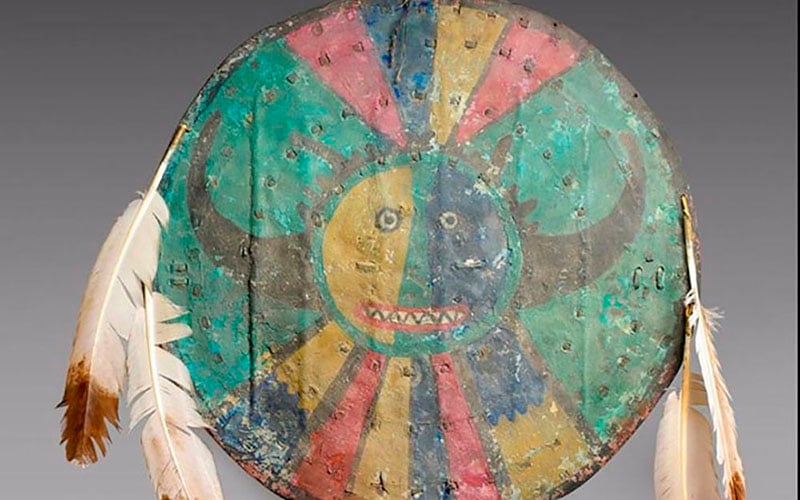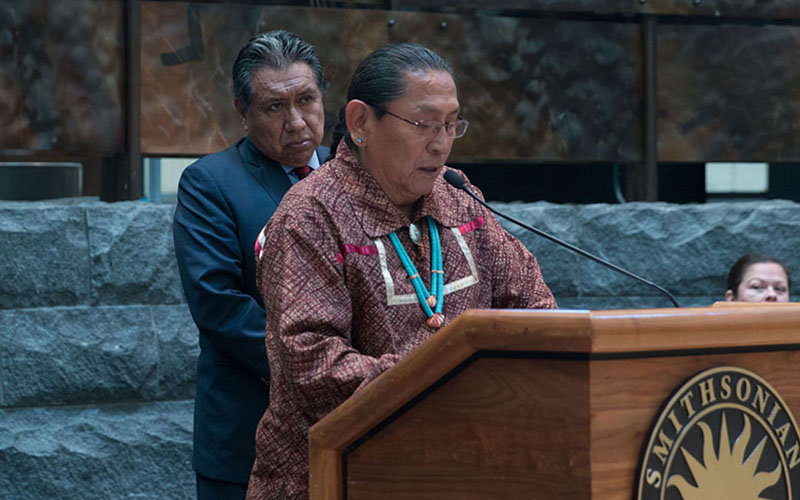
The Acoma shield was set to be sold at auction in Paris in late May, but the sale was halted pending an investigation into charges that they artifact may have been stolen from the tribe. A Senate bill would block the export and sale of culturally significant or sacred tribal artifacts. (Photo courtesy Pueblo of Acoma)

Conroy Chino, left, the traditional leader of the Acoma Pueblo, in May with tribal Gov. Kurt Riley when they and officials of other tribes asked “the people of France to honor our humanity” and return cultural items that were to be auctioned. But the sale of most items in the auction proceeded. (Photo by Emily Zentner/Cronkite News)
WASHINGTON – Arizona and New Mexico lawmakers teamed up this week to sponsor a bipartisan bill that would prevent the auction of sacred tribal items.
The Safeguard Tribal Objects of Patrimony (STOP) Act of 2016, sponsored by Sen. Martin Heinrich, D-New Mexico, would tighten penalties for people trying to export these items for sale online or in foreign auction houses.
Sen. John McCain, R-Arizona, announced Friday that he would sign on to the bill, joining Heinrich and Sens. Jeff Flake, R-Arizona, and Tom Udall, D-New Mexico.
“Many of the cultural artifacts that this bill would protect have a special, sacred connection to Native American people, as well as their history and heritage,” McCain said in a statement from his office.
The bill comes after the attempted sale last month of a sacred Acoma Pueblo shield by the EVE auction house in Paris – which is legal under current law if the seller can show that the item was obtained lawfully.
Acoma Pueblo argued that the shield had been stolen from a family in the tribe sometime in the 1970s. That temporarily halted the sale of the shield, pending an investigation into whether or not it was stolen from the tribe, but hundreds of other items were sold in the May auction.
The Acoma Pueblo, the Navajo Nation and several other tribes gave Heinrich’s bill their support at a news conference where it was introduced Wednesday.
Navajo Nation Speaker LoRenzo Bates said the bill not only benefits the tribe now, but also “preserves our cultural wisdom and items to be utilized for generations to come.”
“The Navajo Nation has consistently sought to repatriate sacred objects, as well as protect our sacred sites, land, culture, language and way of life,” Bates said in his statement. “This legislation strengthens that position and allows tribes the confidence that their traditions and way of life are surely protected.”
The issue has also gained attention in the House, where Rep. Steve Pearce, R-New Mexico, in March introduced a resolution on the Protection of the Right of Tribes to stop the Export of Cultural and Traditional – or PROTECT – Patrimony Resolution.
The measure, which calls on government agencies to investigate the scope of tribal artifact sales and work to stop them, has yet to get a hearing. But Pearce, joined by Reps. Bob Goodlatte, R-Virginia, and James Sensenbrenner, R-Wisconsin, wrote the Government Accountability Office last month to ask that it do what the resolution seeks, by investigating reforms to the way the federal government currently handles these sales.
While the fate of the Acoma shield and other items like it remain to be seen, McCain stressed the necessity of legislation like Heinrich’s to protect tribes’ sacred items.
“I have worked for many years to help protect these objects and keep them within the Native American community,” McCain said. “Congress must impose stiffer penalties to stop these sacred items from being lost forever.”